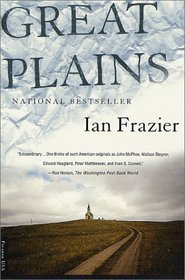Who would have known a bunch of flat land could be so interesting. Just the right mix of history and travelogue.
Fascinating, written in a unique style, where facts pile up side by side like sod bricks and occasionally blow around like the dust that choked the whole country from the plains during the Dust Bowl years.
A lot about geography, history and ecology, both in the past and today (or when the book was written).
But it's all from a masculine point of view! I was reading in another book about Willa Cather's literary perspective on living in the plains and realized that she wasn't even in the book (I checked the index), nor was the perspective of other women who did a lot of the hard work of settling the plains states, because their men had dreams to live there and they did not. Laura Ingalls Wilder, the immensely popular author of Little House on the Prairie, was not mentioned either.
There are hardly any women at all mentioned in the book.
A lot about geography, history and ecology, both in the past and today (or when the book was written).
But it's all from a masculine point of view! I was reading in another book about Willa Cather's literary perspective on living in the plains and realized that she wasn't even in the book (I checked the index), nor was the perspective of other women who did a lot of the hard work of settling the plains states, because their men had dreams to live there and they did not. Laura Ingalls Wilder, the immensely popular author of Little House on the Prairie, was not mentioned either.
There are hardly any women at all mentioned in the book.
A good history of the middle part of the Country, the Great Plains. Lots of Indian history and of the early settlers. Mostly its been a rural farming and ranching area, and still is. Under populated, arid and isolated.
Written by someone with an obvious love for and facination with the geography, history and lore of the Great Plans, Frazier made me want to spend a year exploring its vastness.




![header=[] body=[Get a free book credit right now by joining the club and listing 5 books you have and are willing to share with other members!] Help icon](/images/question.gif?v=2c6bf199)
